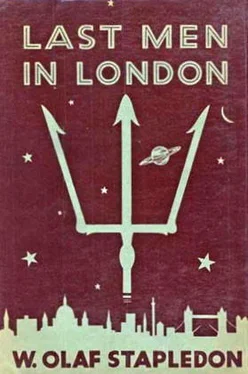In all this work he found that he was constantly and sometimes sternly guided by an inner power, which, though I never again openly communicated with him, he knew to spring from me. Thus he was endowed with an infallible gift of selection and of detective inquiry. Through my help he covered in a few years the whole field of modern life, yet he never wasted his strength on vain explorations. With the precision of a hawk he descended upon the significant individual, the significant movement; and with a hawk’s assurance he neglected the irrelevant. Sometimes his own impulses would run counter to my guidance. Then he would find himself directed by a mysterious, an inner and hypnotic, impulsion, either to give up what he had planned to do, or to embark on some adventure for which his own nature had no inclination.
Month by month, year by year, there took shape in Paul’s mind a new and lucid image of his world, an image at once terrible and exquisite, tragic and farcical. It is difficult to give an idea of this new vision of Paul’s, for its power depended largely on the immense intricacy and diversity of his recent experience; on his sense of the hosts of individuals swarming upon the planet, here sparsely scattered, there congested into great clusters and lumps of humanity, here machine-ridden, there ground into the earth from which they sucked their scanty livelihood. Speaking in ten thousand mutually incomprehensible dialects, living in manners reprehensible or ludicrous to one another, thinking by concepts unintelligible to one another, they worshipped in modes repugnant to one another. This new sense of the mere bulk and variety of men was deepened in Paul’s mind by his enhanced apprehension of individuality in himself and others, his awed realization that each single unit in all these earth-devastating locust armies carried about with it a whole cognized universe, was the plangent instrument of an intense and self-important theme of mind. For Paul had by now learned very thoroughly to perceive the reality of all human beings and of the world with that penetrating insight which I had first elicited from him in childhood. On the other hand, since he was never wholly forgetful of the stars, the shock between his sense of human littleness in the cosmos and his new sense of man’s physical bulk and spiritual intensity increased his wonder. Thus in spite of his perception of the indefeasible reality of everyday things, he had also an overwhelming conviction that the whole fabric of common experience, nay the whole agreed universe of human and biological and astronomical fact, though real, concealed some vaster reality.
It must not be forgotten that throughout his exploration Paul was jealously mindful of my presence within him, and that his sense of an ulterior, a concealed, reality, was derived partly from the knowledge that within himself, or above himself, there was concealed a more exalted being. He knew that I was ever behind his eyes, ever attentive in his ears, ever pondering and sifting the currents of his brain. Yet, save when I swayed him with unaccountable cravings and reluctances, my presence was wholly unperceived.
It must be remembered that I used Paul in two manners, both as a transparent instrument of observation, and as a sample of your mentality. I was interested not only in the external facts which he recorded, but in his reaction to them, in the contrast between his appraisement of them and my own. That contrast I may express by saying that whereas I myself regarded the Terrestrial sphere primarily with detachment, though with detachment which held within itself a passion of imaginative sympathy, Paul regarded all things primarily from the human point of view, though he was able also by a continuous effort to maintain himself upon the loftier plane. For me it was a triumph of imagination that I could enter so fully into your remote and fantastic world. For Paul it was a triumph that in spite of his fervent humanity, his compassion and indignation, he could now regard his world with celestial aloofness. Thus the two of us together were like two different musical instruments playing against one another in two different tempos to produce a single intricacy of rhythm.
To the Neptunian intelligence, however, there was a slightly nauseating pathos even in Paul’s most chastened enthusiasm. Only through the secret and ironical influence of my presence within him could he avoid taking the fate of his world too much to heart. The mind that has but lately received a commanding revelation which exalts it above the pettiness of daily life is very prone to a certain extravagance, a certain farcical pomp, in its devotion. The Neptunian mind, on the other hand, born into the faith and needing no sententious conversion, was sometimes impelled by Paul’s solemnity to wonder whether even the final tragedy of man on Neptune called most for grief or for laughter.
3. FRUITS OF THE RESEARCH
Paul had already made it clear in his own mind what the human aim should be. Man should be striving into ever-increasing richness of personality. He should be preparing his planet and his many races of persons to embody the great theme of spirit which was as yet so dimly, so reluctantly, conceived. In fact man should be preparing to fulfil his office as a centre in which the cosmos might rejoice in itself, and whence it might exfoliate into ever more brilliant being. Paul found also in his heart a conviction, calm, though humanly reluctant, that in the end must come downfall; and that though man must strive with all his strength and constancy of purpose, he must yet continually create in his heart the peace, the acceptance, the cold bright star of cognizance which if we name it we misname.
In his exploration Paul sought to discover what progress man was making in this twofold venture. He found a world in which, far from perceiving the cosmical aspect of humanity, men were for the most part insensitive even to the purely human aspect, the need to make a world of full-blown and joyful human individuals. Men lived together in close proximity, yet with scarcely more knowledge of one another than jungle trees, which blindly jostle and choke, each striving only to raise its head above its neighbours. Beings with so little perception of their fellows had but a vague apprehension of the human forest as a whole, and almost none of its potentialities. Some confused and dreamlike awareness of man’s cosmical function no doubt there was. As a very faint breeze, it spread among the waiting tree-tops. But what was to come of it?
In such a world there was one kind of work which seemed to Paul, not indeed the most important, for many operations were equally important, but the most directly productive work of all, namely, education. Among the teachers, as in all walks of life, Paul found that, though some were indeed pioneers of the new world-order, many were almost entirely blind to the deeper meaning of their task. Even those few who had eyes to see could do but little. Their pupils had at all costs to be fitted for life in a world careless of the spirit, careless of the true ends of living, and thoughtful only for the means. They must be equipped for the economic struggle. They must become good business men, good engineers and chemists, good typists and secretaries, good husband-catchers, even if the process prevented them irrevocably from becoming fully alive human beings. And so the population of the Western world was made up for the most part of strange thwarted creatures, skilled in this or that economic activity, but blind to the hope and the plight of the human race. For them the sum of duty was to play the economic game shrewdly and according to rule, to keep their wives in comfort and respectability, their husbands well fed and contented, to make their offspring into quick and relentless little gladiators for the arena of world-prices. One and all they ignored that the arena was not merely the market or the stock exchange, but the sand-multitudinous waste of stars.
Читать дальше












